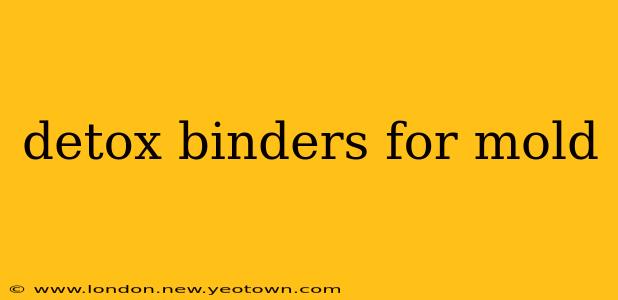Mold exposure can be a significant health concern, leaving many seeking ways to support their body's natural detoxification processes. While medical advice should always be sought for mold-related illnesses, understanding the role of detox binders can offer a clearer picture of how you might approach supporting your well-being. This isn't a cure-all, and it's crucial to remember that this information is for educational purposes only and does not constitute medical advice. Always consult with a healthcare professional before starting any new supplement regimen, especially if you suspect mold toxicity.
My journey into researching detox binders for mold began after a personal experience with mold exposure in my own home. The persistent fatigue, brain fog, and respiratory issues were debilitating. After extensive testing and working with a functional medicine doctor, I began exploring natural ways to support my body's detoxification pathways. This exploration led me to delve deep into the world of detox binders, and I’m sharing my findings with you today.
What are Detox Binders?
Detox binders are substances that can bind to toxins in the digestive tract, preventing their absorption into the bloodstream. Think of them as tiny sponges that soak up unwanted substances, facilitating their elimination from the body through bowel movements. Importantly, they don't specifically target mold toxins alone but can help remove various toxins, including some potentially released during mold remediation.
What are Some Common Detox Binders?
Several substances are frequently used as detox binders. Let's examine a few:
Activated Charcoal:
Activated charcoal is a highly porous form of carbon that has a large surface area, allowing it to effectively bind to a wide range of toxins, including mycotoxins (toxins produced by molds). It's important to note that activated charcoal can interfere with the absorption of some medications, so it's crucial to consult your doctor if you're on any medications.
Zeolite:
Zeolite is a volcanic mineral that's been used for its detoxifying properties. It's believed to bind to heavy metals and some toxins, potentially assisting in their removal from the body. Research on zeolite's effectiveness in binding mycotoxins specifically is still limited.
Bentonite Clay:
Bentonite clay is another popular detox binder known for its ability to absorb toxins and impurities. Like zeolite, its effectiveness in specifically targeting mycotoxins requires further research.
Chlorella:
Chlorella is a type of green algae that contains chlorophyll. It's believed to have detoxifying properties, possibly aiding in the removal of heavy metals and other toxins. Again, specific research on its effects on mycotoxins is ongoing.
Do Detox Binders Remove Mold from the Body?
This is a crucial question. Detox binders are not a replacement for proper mold remediation in your environment. They can support your body's detoxification pathways, but they won't remove mold that's already present in your home or body. Addressing the source of mold exposure is paramount. Furthermore, the research on the effectiveness of specific detox binders against mycotoxins is still ongoing and requires further investigation.
What Else Can I Do to Support Detoxification After Mold Exposure?
Beyond detox binders, other strategies can help support your body's natural detoxification systems:
- Hydration: Drinking plenty of water is vital for flushing toxins from your system.
- Nutrient-Rich Diet: Focus on a diet rich in fruits, vegetables, and whole grains to provide your body with the nutrients it needs to support detoxification.
- Supportive Supplements: Certain nutrients, such as glutathione and N-acetylcysteine, are known to support liver detoxification.
- Gut Health: A healthy gut microbiome plays a crucial role in detoxification. Consider probiotics and prebiotics to support your gut health.
- Sleep: Adequate sleep is essential for cellular repair and detoxification.
Are There Any Side Effects of Using Detox Binders?
While generally considered safe when used as directed, detox binders can have side effects. These can include constipation, nausea, and changes in bowel movements. It's crucial to start with a low dose and gradually increase it as needed.
Conclusion:
Detox binders can be a helpful part of a comprehensive approach to supporting your body's natural detoxification processes after mold exposure. However, they are not a standalone solution. Remember that professional medical guidance is crucial for managing any health concerns related to mold exposure. Prioritizing proper mold remediation in your environment remains the primary and most effective step. This information is for educational purposes only and does not constitute medical advice. Always consult your healthcare professional before starting any new supplement regimen.

